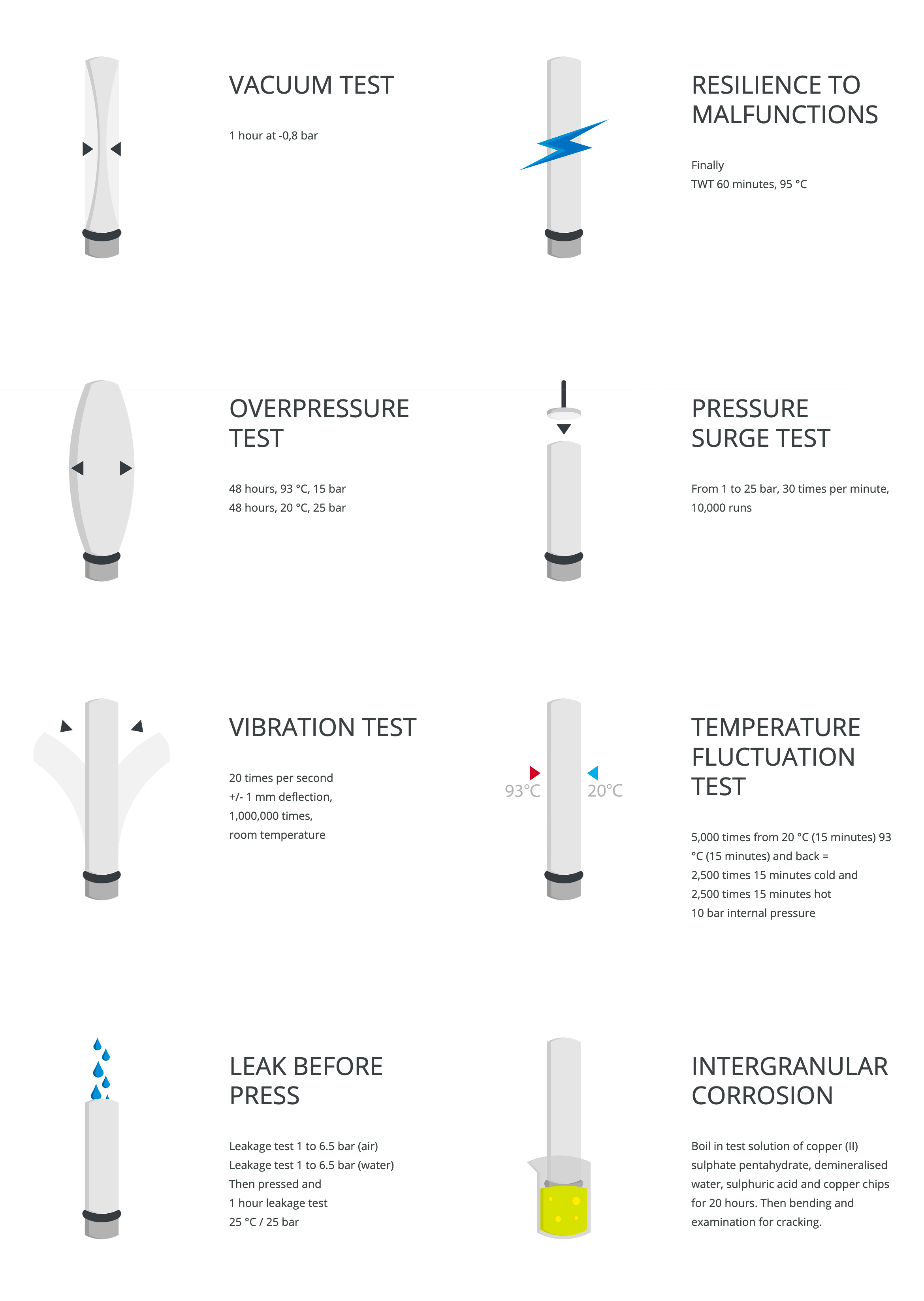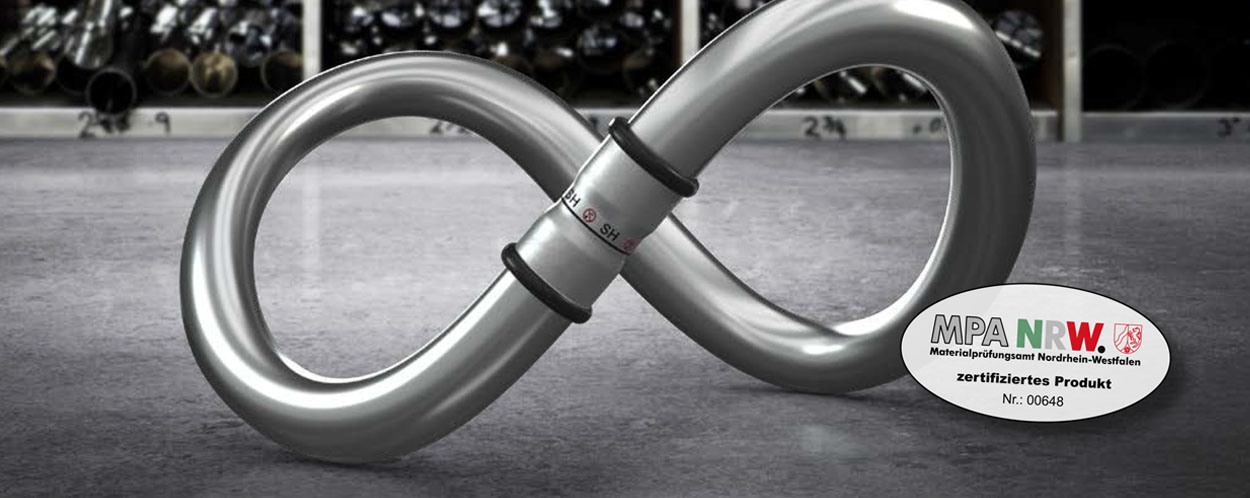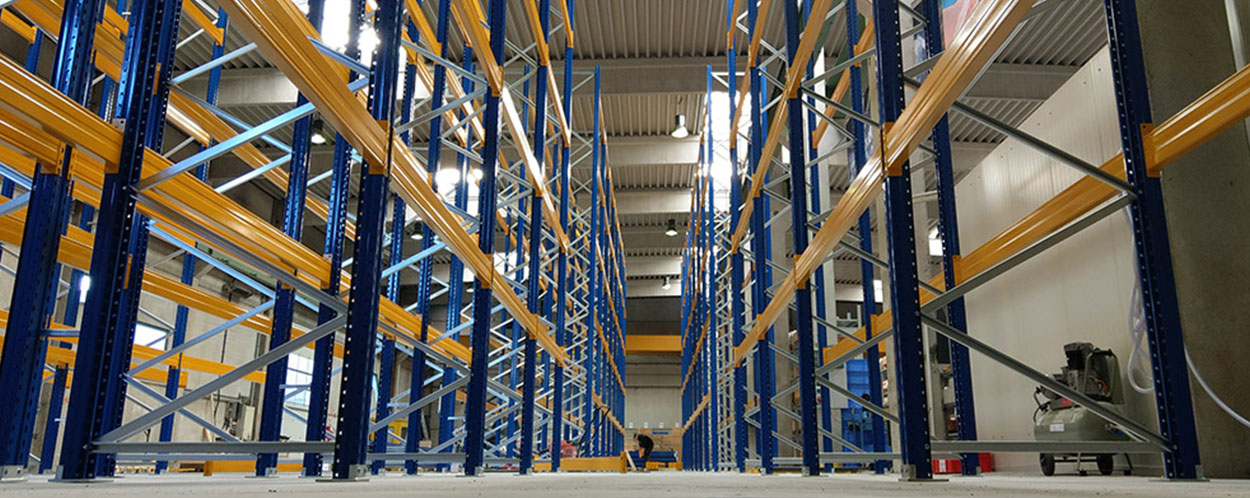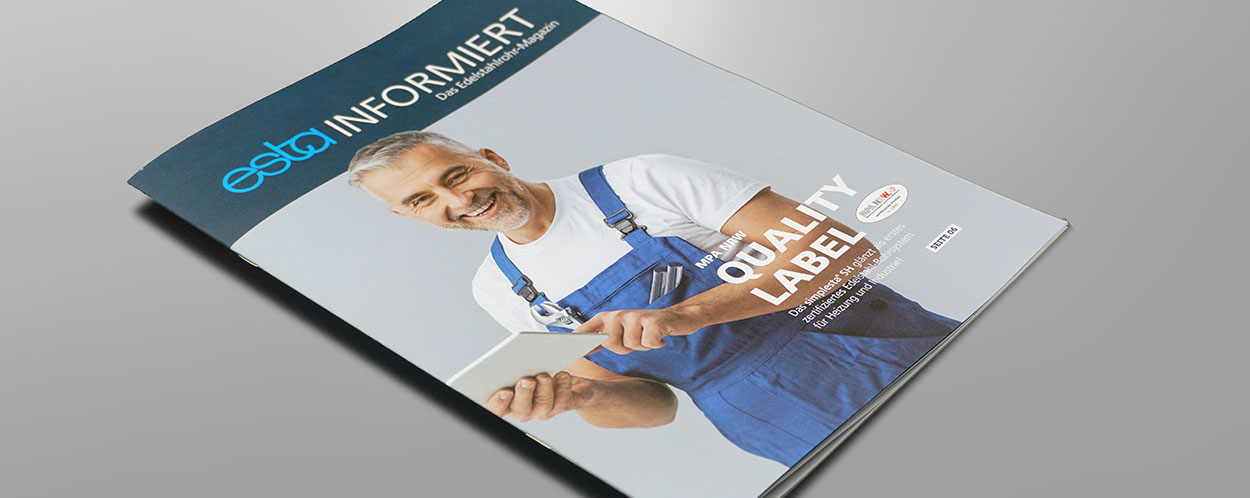ESTA ROHR EXCELS ON THE GLOBAL STAGE AS THE FIRST COMPANY WITH A CERTIFIED STAINLESS STEEL PIPE SYSTEM FOR HEATING INSTALLATIONS AND INDUSTRY.
We and the North Rhine-Westphalia Materials Testing Office (MPA NRW) have jointly developed the first certification and testing standard for a stainless steel pipe system for heating installations, cooling circuits and other similar applications.
The SH stainless steel pipe system for heating and industrial installations from our company's simplesta® product range formed the starting point for this.
Prior to the development of our simplesta manufacturing systems, we excelled in the production of stainless steel drinking water pipes. Over the years we have developed a manufacturer system comprising pipes, associated compression joints and processing tools for drinking water installations: the simplesta® ST stainless steel pipe system. In its capacity as a DVGW (German Technical and Scientific Association for Gas and Water) approved test laboratory for products used in the water supply chain, the MPA NRW has been confirming the pipe systems we manufacture comply with the guidelines and applicable standards of the DVGW for more than 25 years.
We are now complementing the drinking water products with another stainless steel system made using a new ferritic pipe material, number 1.4520, and associated compression joints: the simplesta® SH stainless steel pipe system. This system is designed specifically for heating engineering applications and closed water circuits. Like all piping for applications of this nature, the system is not subject to any European or national oversight that involves certification. This means that it is solely incumbent upon us as the manufacturer to determine the technical design and continuous production monitoring. Having said that, the MPA NRW does offer a voluntary certification option.
After consulting with the MPA NRW at length, we decided to subject the SH pipe system to voluntary product certification. The aim here is to confirm the manufacturer has done more than just comply with the national or international standards applicable for our simplesta® SH stainless steel pipe system. In addition to the certainty of receiving quality confirmed on an ongoing basis, planners, customers and processors also benefit from the fact that it is easier to prove the products used comply with accepted technical standards in the event of damage. This was implemented by first drawing up a certification schedule (Longitudinally welded pipes and compression joints made of stainless steels for use in heating installations - MPA NRW ZP 22-03) containing the basic specifications, such as normative documents, requirements a product must meet, in-house production control, initial testing, in-house monitoring and regular external monitoring. This was then supplemented by an appropriate testing schedule (MPA NRW ZP 22-0-0001), which lists the individual tests in detail.
After preparations lasting a good 18 months, practical testing began.
The basic tasks were completed positively and quickly. They involved an assessment of the operation-, HR- and test-related requirements and the technical assessment of in-house production control. Being a long-established supplier to the automotive sector and manufacturer of process and drinking water pipes, such topics are nothing new to us, of course. The product testing took on a greater dimension, especially in terms of time allocated. This applies to the so-called temperature cycle test, in particular. With regard to the conditions, a heating circuit with open compressor pressure control and an expansion tank with no diaphragm were designed (worst case). Low-saline filling water was then used in accordance with VDI 2035 Part 2 and a corrosion protection agent was added. This made it possible to test the stability of the EPDM sealing rings when exposed to the treated water at the same time. Since the test took place within a short period of time when set against the usual service life, conditions (compared to an actual heating operation) were intensified significantly so as to identify possible ageing processes in the sealing rings. To be specific, 2,500 15-minute cycles with hot water (93 °C) and 2,500 15-minute cycles with cold water (20 °C) were run alternately. Each hot/cold cycle had to be completed in less than a minute. Heating control systems usually aim to achieve the lowest possible flow temperature and a sliding control, exposing seals and gaskets to much lower stresses, of course. This cyclic loading during 1,250 hours of fast-motion testing means it is reasonable to assume that the pipe system will reach or exceed a service life of 50 years, as is often applied in building services engineering, reliably. Of course, the temperature cycles have no effect on the actual stainless steel in the long run.
Finally, the incident safety (response of the safety device) was demonstrated for solid fuel boilers (95 °C for 60 minutes). The test programme also considered other stresses that may occur during operation and values that actually occur were always exceeded with multiple safety margins:
Safety against the development of underpressure of -0.8 bar for one hour, then against overpressure of 15 bar at 93 °C followed by 25 bar at 20 °C, each for 48 hours. 10,000 pressure surges (1 to 20 bar) were completed. 1,000,000 vibrations (frequency: 20 per second) were applied at an overpressure of 15 bar to U-shaped pipe sections made with compression joints. The requirement was always that the joints stay reliable and tight when exposed to those stresses. However, the testing was only finished after the usual measurements had also been completed on a large number of parts. The focus here was dimensional accuracy and conformity with the drawings submitted. The steel was also analysed and required an attestation from the steel works. The test programme was supplemented by material testing for tensile performance, drift expansion, intergranular corrosion resistance, bending performance and surface condition, for example.
To ensure agreed qualities are permanently maintained, a monitoring contract with the MPA NRW, which sets out the basic legal framework, is an obligatory element of the approval to bear the 'Quality Label'.

It is particularly important that the MPA NRW be allowed access to the manufacturer's plant and warehouses at any time unannounced, where samples may be taken and sight of technical documentation and records must be provided. Furthermore, a record of all customer complaints regarding compliance with the certification requirements must be kept and handed over to the MPA NRW for inspection.
From initial testing across regular external monitoring through to controlled production with cross-checking of the pipes and compression joints, this package of measures affords vendors, planners, processors and developers a level of safety and quality, which in many respects stands out from non-certified products, for heating installations and closed water circuits.
Learn more about the simplesta® SH performance guarantee.
This is an article from our customer journal esta INFORMS: The Stainless Steel Pipe Magazine



